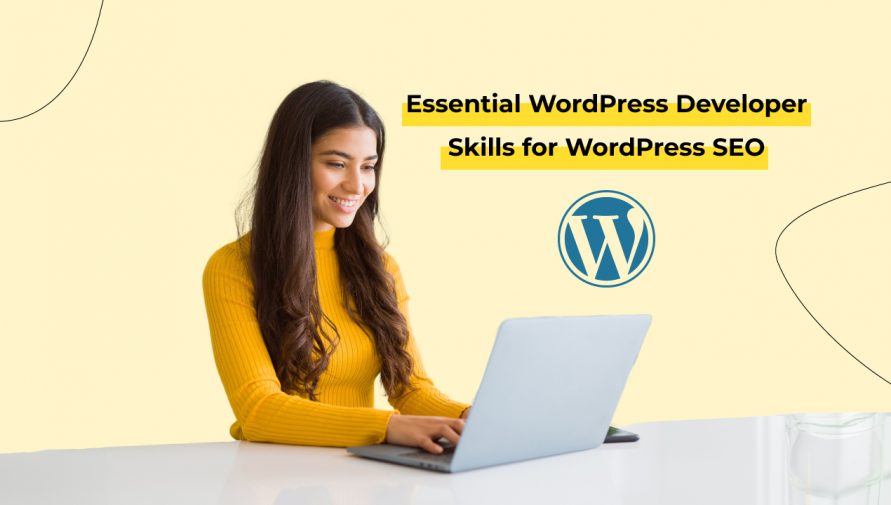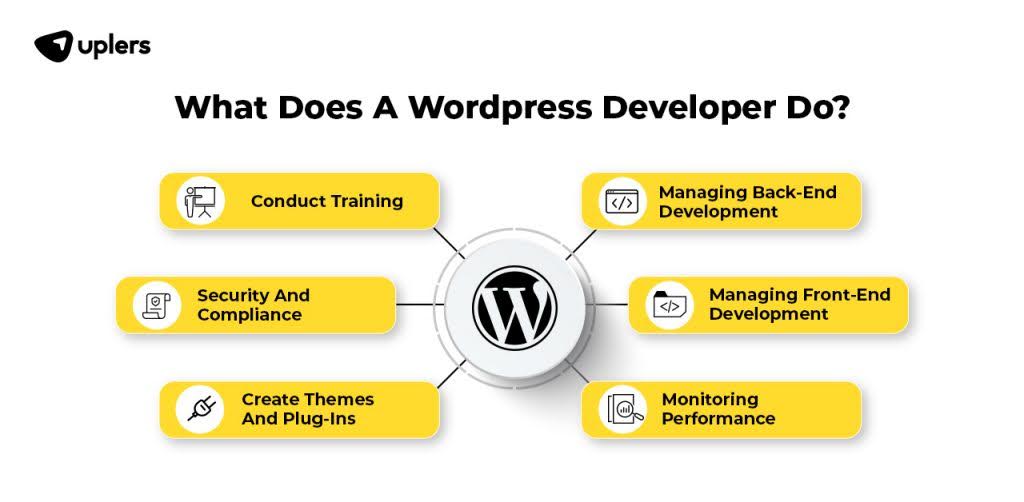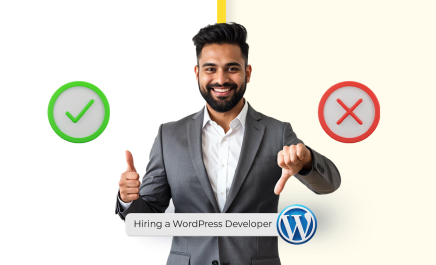Essential WordPress Developer Skills for Effective SEO in WordPress
- Shachi Dixit
- July 29, 2024
- 6 Minute Read

Search Engine Optimization (SEO) is crucial for achieving higher conversions and improved rankings on search engine results pages (SERPs).
By effectively using keywords and implementing key WordPress SEO strategies, websites can attract more audiences and enhance brand credibility. This approach helps consumers easily find businesses online.
Top brands and start-ups often hire WordPress developers to create SEO-optimized sites, which can lead to increased leads and higher revenue. Read on as we discuss the essential skills that WordPress developers need to enhance SEO performance.
Overview of WordPress as a Leading CMS
WordPress is a leading Content Management System that powers more than 800 million websites worldwide. It is renowned for its user-friendliness and range of plugins and themes.
WordPress’s open-source nature helps brands engage in continuous improvement cost-effectively. Using WordPress, you can customize your web content and integrate SEO-friendly features. It also empowers businesses to optimize their sites for better search engine performance.
Why SEO Is Crucial for WordPress Websites
Let us understand the key reasons why businesses need to consider WordPress SEO:

1. Drives Organic Traffic and Visibility
SEO drives organic traffic to WordPress websites. If you optimize your site, you can rank among the highest in search engine results pages. High-ranking websites attract more audiences, which means more people are interested in your content or your products.
2. Enhances User Experience and Engagement
WordPress SEO has the power to enhance user experience. If your WordPress site is well-optimized, it also means that it is user-friendly, mobile-friendly, loads quickly, and comes with easy navigation.
3. Influences Conversion Rates and Business Growth
When your WordPress site ranks higher in search results, visitors can visit your landing pages and site content. If your site content is well-equipped with calls to action, unique content, and user-friendly design, you can convert these leads into customers.
Key WordPress SEO Components
Some of the most critical SEO components in WordPress are:
1. On-Page WordPress SEO
On-page WordPress SEO means optimizing individual pages on your WordPress site. This includes:
- Keywords: Incorporate relevant keywords throughout your content. Find, research, and identify the most useful keywords and include them in meta titles, headings, and body text.
- Meta Tags: Create compelling meta titles and descriptions that describe your page’s content. Include keywords in the meta information to help search engines understand the relevance of your content and rank your pages accordingly.
- Content Optimization Strategies: Ensure that your content is high-quality, informative, and engaging. This will help you retain visitors’ interest and encourage them to explore more of your website.
2. Technical WordPress SEO
Common technical SEO issues include:
- Slow page speeds: 72.3% of sites
- HTTP to HTTPS redirect issues: 88% of sites
- Missing alt attributes: 80.4% of sites
Technical WordPress SEO focuses on improving these elements of your WordPress site. This includes:
- Site Speed: It is of paramount significance to have your site load quickly. You can enhance site speed by optimizing images and using browser caching. Make sure you try to minimize code and use the best plugin for SEO in WordPress to enhance the loading speed of your website.
- Mobile-Friendliness – Implement a responsive website design that works across all devices. You must ensure that mobile users have a positive experience when searching for your business and browsing through your catalogs.
3. Off-Page SEO in WordPress
WordPress developers must effectively use off-page SEO to drive traffic and improve the site’s authority.
This includes:
- Backlinks: They should be able to acquire high-quality backlinks from reputable websites. This means that your content is valuable and trustworthy. Use powerful strategies like blogging and creating shareable content to enhance audience reach.
- Social Signals: Make the most of social media platforms to promote your content and engage with your audience. Social media signals like likes, shares, and comments can drive traffic to your site.
Essential WordPress Developer Skills for SEO
Consider these WordPress developer skills that are crucial for enhancing SEO:

1. Proficiency in Using Plugin for SEO in WordPress
One of the key WordPress developer skills is proficiency in using SEO plugins. Professional WordPress developers should be able to use plugins like Yoast SEO, All in One SEO Pack, and Rank Math.
Yoast SEO is applied to more than 5 million websites and is the most reviewed plugin for SEO in WordPress, with an average rating of 4.8 out of 5. These plugins can optimize your website’s SEO effortlessly.
A developer skilled in these plugins can:
- Set up and customize the plugins.
- Use a relevant plugin for SEO in WordPress to add meta titles and descriptions
- Focus on keywords to optimize content readability.
- Create XML sitemaps that help search engines crawl.
2. Knowledge of HTML, CSS, and JavaScript for On-Page SEO
A thorough understanding of HTML, CSS, and JavaScript is critical for implementing effective on-page SEO. Key aspects include:
- HTML Tags: Candidates must proficiently use proper HTML tags for headings, meta descriptions, alt text for images, and structured data.
- CSS: They must ensure that the site’s design is user-friendly
- JavaScript: They must effectively use JavaScript to maintain the site’s speed and search engine crawlability. Developers should ensure that JavaScript elements are optimized and do not adversely impact the site’s SEO performance.
3. Understanding of Website Architecture and Internal Linking
Another skill is that the developer must understand the logical architecture of creating a well-designed site. The developers must effectively use internal linking and a proper outline.
Here are some significant areas to work on:
- Site Structure: The developer must know how to create an organized website structure. This ease can help users navigate across the site. Even the brand will be able to showcase a logical hierarchy of pages and categories.
- Internal Linking: An effective internal linking strategy distributes link equity throughout the site. It helps search engines understand the importance of each page.
Assessing SEO Knowledge in a WordPress Developer
Here are some ways in which you can assess the SEO knowledge of WordPress developers:

1. Ask Relevant Interview Questions to Assess SEO Expertise
To assess a WordPress developer’s SEO knowledge. It is important to ask relevant interview questions. Here are some examples:
- What do you know about website SEO and its key components of on-page and off-page SEO?
- How can you create a website with a fast loading speed?
- How do you implement structured data on a site?
2. Conduct Practical Tests and Coding Challenges
You can also conduct some practical tests and coding challenges to get the gist of a developer’s hands-on SEO skills. Consider the following tasks:
1. HTML, CSS, and JavaScript Optimization
Provide a sample webpage with SEO issues and ask the candidate to identify and fix the problems. You can ask them to:
- Optimize heading tags
- Improve page speed
- Use of alt text for images.
2. Ensure Mobile Optimization
Ask the candidate to demonstrate how they would make a WordPress site mobile-friendly. Ask them how they can focus on responsive design and performance optimization.
3. Review Past Projects and SEO Results
Examining a developer’s past projects can provide valuable insights into their SEO capabilities. Here’s how to evaluate their work:
- Portfolio Review: Request examples of previous WordPress sites they have developed. Look for evidence of SEO best practices, such as clean URL structures, optimized content, and effective use of SEO plugins.
- Case Studies: Ask the applicant to showcase real projects that they have worked on. They must show instances where they implemented SEO strategies. They should be able to explain the challenges they faced and the solutions they implemented. Assess the results achieved by the candidates and employ them accordingly.
Best Practices for SEO-Optimized WordPress Development
Follow these tips and techniques for enhancing SEO-Optimized WordPress Development:

1. Keep Up with SEO Trends and Algorithm Updates
SEO algorithms, strategies, and requirements are frequently updated. You must always stay informed about critical SEO changes to improve your website’s rankings. Best practices include:
- Follow industry leaders
- Attend webinars and conferences
- Join SEO communities
- Conduct regular training and certification programs.
2. Implement a Clean and Efficient Code
An efficient code leads to an SEO-optimized WordPress site. It ensures faster site loading times and a convenient user experience. Best practices include:
- Minimize CSS and JavaScript
- Use Proper HTML Structure
- Optimize Images
- Leverage Browser Caching
- Enable GZIP Compression
3. Audit and Update the Website Regularly
SEO is an ongoing process that requires regular monitoring and updates. Best practices for auditing and updating your website include:
- Conduct SEO Audits
- Monitor Site Speed
- Update Content
- Check Mobile Usability
- Analyze Competitors
Final Words
SEO is critical for successful WordPress development. It makes sure that your website ranks well on search engine results pages.
SEO drives organic traffic and enhances brand visibility. You must hire WordPress developers to enhance -page elements and implement technical SEO best practices. Focus on off-page strategies and make an effort to improve conversion rates and business growth.
When hiring WordPress developers, consider their technical expertise, particularly in SEO. Look for developers with a strong understanding of SEO best practices, including the use of relevant plugins, proficiency in HTML, CSS, and JavaScript, and experience with both on-page and technical SEO elements.
Make sure you assess their ability to design a logical site structure, optimize for speed and mobile usability, and implement effective internal linking strategies.

Thank you for submitting the details!
We will keep your information safe. Feel free to contact us with any questions at hello@uplers.com
Please check your email for next steps shared by Robert.

















